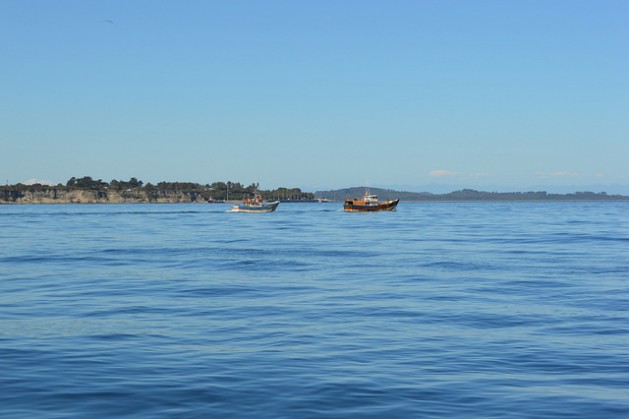[ad_1]

MADRID, Jun 07 (IPS) – The excellent news: oceans cowl three-quarters of the Earth’s floor, include 97% of the world’s water, characterize 99% of the dwelling house on the Planet by quantity, and are a serious supply of meals and drugs. A lot in order that they’re the primary supply of protein for greater than a billion individuals around the globe.
Extra: Oceans produce a minimum of 50% of the Planet’s oxygen, whereas absorbing about 30% of carbon dioxide produced by people, buffering the impacts of worldwide warming.
And the dangerous information
The dangerous information is that, with 90% of massive fish populations depleted, and 50% of coral reefs destroyed, human beings are taking extra from the ocean than will be replenished.
Certainly, there’s one other ‘crime’ being dedicated as a consequence of the unrelenting enterprise obsession with making an increasing number of cash. It’s about unlawful, unreported and unregulated (IUU) fishing, a apply that threatens marine biodiversity, livelihoods, exacerbates poverty, and augments meals insecurity.
The ‘felony’ depletion of the fish
Such unlawful actions are responsible for the loss of 11–26 million tons of fish each year, which is estimated to have an economic value of 10–23 billion US dollars.”
A lot in order that if ‘enterprise’ goes as regular –and all point out that it’s going to– there will likely be extra tons of plastic than fish by the yr 2050, in response to the World Wildlife Fund.
Furthermore, there are problems with marine particles and marine litter concerned in IUU fishing, which aren’t solely associated to the marine atmosphere but in addition the protected navigation of ships, explains the Worldwide Maritime Organisation (IMO).
Who’s the worst enemy?
Commenting on their distinctive significance for human beings, the United Nations chief, António Guterres warned on the event of the 2023 World Oceans Day (8 June) that “we must be the ocean’s finest pal. However proper now, humanity is its worst enemy.”
Guterres referred to as oceans ‘the inspiration of life’, as they provide the ‘air we breathe and the meals we eat,’ whereas regulating local weather and climate.
The best reservoir of biodiversity. And of litter
“Marine biodiversity is beneath assault from overfishing, over-exploitation and ocean acidification. Over one-third of fish shares are being harvested at unsustainable ranges. And we’re polluting our coastal waters with chemical substances, plastics and human waste.”
In line with reports, an estimated 5.25 trillion items of plastic, weighing 269,000 tons, is distributed throughout the ocean.
The United Nations has lengthy warned the worldwide group of the harm ocean rubbish does to the economic system and the atmosphere, as reported by the big vitality firm Iberdrola.
This waste decimates marine ecosystems by killing greater than one million animals a yr, it studies, including that organisations like Greenpeace report that floating plastic accounts for under 15% of the full, whereas 85% stays hidden underwater — at depths of up to 11,000 metres, and even trapped in Arctic ice.
Marine air pollution
Marine air pollution accounts for a minimum of 85% of marine waste, and plastic litter is the chief pollutant, reports the UN Setting Programme (UNEP).
Each minute, one garbage truck of plastic is dumped into our ocean. If nothing is finished about it, by 2040, the equal of fifty kg of plastic per metre of shoreline worldwide is projected to circulation into the ocean yearly, the world main environmental physique informs.
It’s estimated that by the yr 2030, the world’s coastal populations will contribute three trillion dollars to the global economy in sectors as numerous as fisheries, and tourism, in addition to rising inexperienced and blue economies resembling renewable vitality and marine biotechnology.
Extra human ‘crimes’ in opposition to life
One other main physique, the UN Conference to Fight Desertification (UNCCD) has additionally centered on the hazards of plastic air pollution additionally to the world’s soils and crops.
On this, it reports that the qualities that make plastic helpful are additionally those that make it hazardous: ‘designed to idiot nature itself, most plastics are too resilient to biodegrade in a significant timeframe.’
The Conference additional says that the world’s present efforts to recycle plastics have been inefficient thus far: solely 9% of plastic is recycled globally, and far of it’s both thrown away or can’t be processed for recycling.
“One-third of all plastic waste results in soils or freshwater, endangering our meals, our livestock and the well being of the soil. Invisible to the attention, microplastics linger within the atmosphere, the meals chain, and our our bodies.”
Soil is the inspiration of our agricultural methods which help practically all food-producing crops: about 95% of our meals comes from the soil, UNCCD additional explains.
“Fertile soil that produces meals is a finite useful resource, and plastic air pollution can have a long-lasting affect on soil well being, biodiversity and productiveness, all of that are important to meals safety.”
Lethal contaminated meals
Speaking about meals safety, do you know that “day-after-day, some 1.6 million individuals worldwide fall unwell from consuming contaminated meals, which kills 420,000 individuals every year,” as reported by two UN companies on the event of the 2023 World Food Safety Day, (7 June).
Each the World Well being Group (WHO) and the Meals and Agriculture Group (FAO) have in truth reported that “over 200 illnesses are attributable to consuming meals contaminated with micro organism, viruses, parasites or chemical substances resembling heavy metals.”
The staggering impacts of human actions in opposition to the oceans and in all places else don’t finish right here. There may be nonetheless extra, rather more, to report on the lethal penalties for the world’s oceans, soils, and the entire cycle of lifetime of the human habit to fossil fuels.
© Inter Press Service (2023) — All Rights ReservedOriginal source: Inter Press Service
[ad_2]

